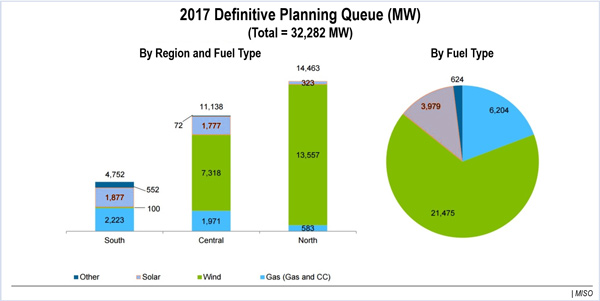By Amanda Durish Cook
Although MISO’s new queue design has just been implemented, RTO officials are continuing to look for improvement.
“We are not done. Queue reform is a journey, not a destination,” MISO Vice President of System Planning and Seams Coordination Jennifer Curran told the System Planning Committee of the Board of Directors on Feb. 21. FERC approved the changes in January. (See FERC Accepts MISO’s 2nd Try on Queue Reform.)
Curran said that while MISO has already addressed multiple requirements that could arise from FERC’s December Notice of Proposed Rulemaking (RM17-8) requiring changes to pro forma large generator interconnection rules, the NOPR could require additional work on cost caps and eliminating barriers to storage’s participation.
In 2008, the RTO found that if it didn’t change its queue process, it would take a “clearly unacceptable” hundreds of years to process all of the project requests then in the queue, Curran said. Since then, MISO has moved from a “first-come, first-served” approach to a “first-ready, first-served” approach. She said historically 15% of queue entrants’ requested megawatts make it to commercial operation.
MISO’s new rules are designed to reduce restudies, allowing it in some instances to keep milestone payments from withdrawn projects to fund transmission upgrades on which other queue projects relied.
“Queue reform is, and has been, an on-going process. We will continue working with stakeholders to ensure we have the most efficient and effective rules in place to interconnect resources of all types,” Curran said.
Curran said the MISO queue remains dominated by wind projects, although there is also a “non-negligible” number of solar requests. She said the number of projects in the queue will face uncertainty in 2020 as wind production tax credits expire and planned wind projects could drop.
Wind has long had the highest project drop-out rates because several developers often enter the queue to serve a single load area, Curran said.
She also said MISO’s future HVDC lines must enter the interconnection queue under its “other” category because merchant lines can behave like new generation with their ability to inject energy.
Aside from 72 MW of storage planned for MISO Central, there is not a lot of storage on the horizon, she said. Storage also is a part of the RTO’s “other” queue categorization.
Duff-Coleman in Monitoring Phase
MISO has moved into the monitoring phase of Republic Transmission’s Duff-Coleman project construction in southern Indiana and Kentucky, Priti Patel, regional executive for MISO North and executive director of the RTO’s Competitive Transmission Administration, told stakeholders.
The RTO will receive quarterly project reports from Republic Transmission that will detail any construction delays or cost overruns, Patel said. Before Order 1000, she said, MISO received “vary basic” project reporting on market efficiency and multi-value projects.
Project reporting “is a very critical tool for MISO, to hold developers responsible. … Mainly, we will monitor and make visible the developer’s activities on the project so the developer eventually delivers what they have promised,” Patel said.
MTEP 16’s Huntley-Wilmarth upgrade — though not competitively bid because of Minnesota’s right-of-first-refusal statute — will also be subject to the more intensive reporting as a market efficiency project, Patel said. (See MTEP 16 Proposes 394 Projects at $2.8 Billion.)
Although MISO has no jurisdiction over the two projects, she continued, stakeholders can use its progress reports to raise any concerns to state or federal regulators.
Director Phyllis Currie asked if MISO encountered anything unexpected in last year’s competitive bid process.
MISO was impressed that all 11 developers provided “much more” information than required of them in the request for proposals, Patel replied.
MISO General Counsel Andre Porter halted the board’s question on whether any developers left disgruntled with the process. “That’s best left for closed session,” he said.
In a related matter, Patel said that MISO will complete its qualification of transmission developers by March 7.






